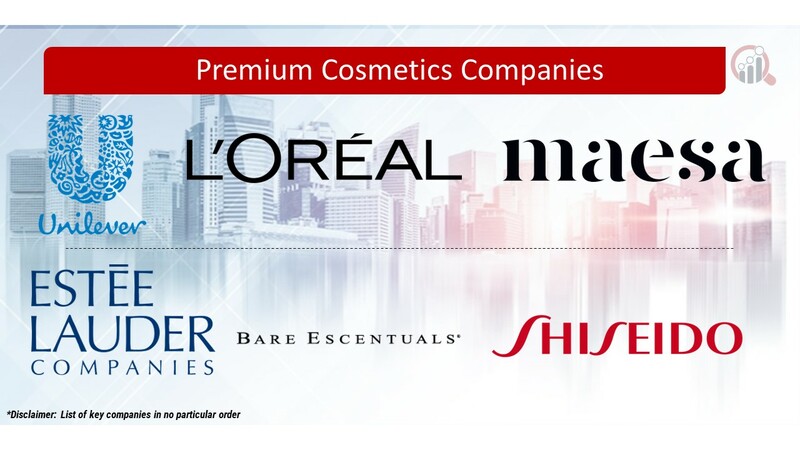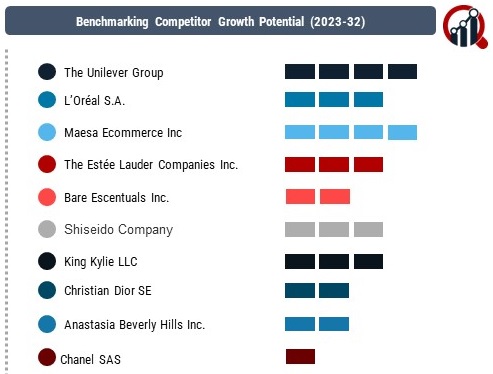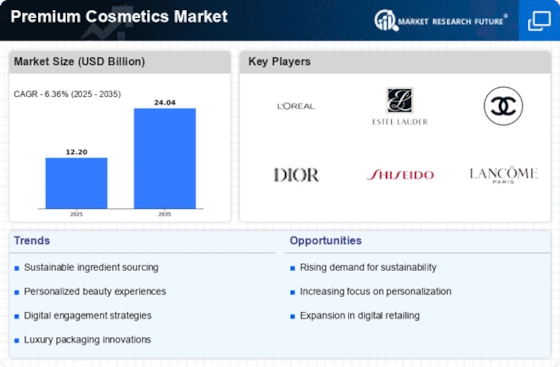Top Industry Leaders in the Premium Cosmetics Market

Market share analysis within the Premium Cosmetics industry encompasses pivotal factors. Brand reputation, product quality, innovation, pricing strategies, distribution channels, and engagement with beauty influencers significantly impact market positioning. Brands excelling in providing high-quality premium cosmetics with innovative formulations, luxury packaging, and effective marketing strategies secure a larger market share. Additionally, factors like positive reviews from beauty experts, endorsements by celebrities, and brand loyalty among consumers influence market share.
New and emerging companies in the Premium Cosmetics market often focus on niche aspects such as clean beauty, inclusivity, or sustainable practices. These emerging players leverage innovation in clean formulations, introduce diverse shade ranges for inclusivity, and emphasize eco-friendly packaging to appeal to consumers seeking ethical and diverse beauty options. They rely on digital marketing, collaborations with beauty influencers, and direct-to-consumer models to gain visibility and compete with established brands.
Industry news in the Premium Cosmetics market revolves around trends in clean beauty, sustainability, and evolving consumer preferences. Brands invest in research for clean and sustainable ingredients, reduce environmental impact in packaging, and adapt to changing beauty standards. Additionally, there's an emphasis on educating consumers about the benefits of premium cosmetics through marketing campaigns and initiatives promoting luxury and efficacy.
Current investment trends within this market highlight a strong focus on innovation, sustainability, and digital presence. Companies invest in R&D for advanced formulations, sustainable sourcing of ingredients, and technology-driven designs for enhanced beauty products. Furthermore, investments in influencer partnerships, social media marketing campaigns, and enhancing e-commerce platforms to reach a wider audience are prevalent among industry players.
The overall competitive scenario within the Premium Cosmetics market remains dynamic and consumer-driven. Established players face competition from newer entrants focusing on innovation, sustainability, and inclusivity. Differentiation through product quality, innovation, luxury branding, pricing strategies, marketing initiatives, and alignment with evolving consumer preferences for high-quality, ethical, and diverse beauty products will determine a company's success and competitive standing in this rapidly evolving market landscape.
Industry News and Investment Landscape
- Acquisitions in the recent past, such as L'Oréal's acquisition of CeraVe, point to market consolidation patterns.
- A dedication to future innovation is demonstrated by increased R&D expenditures that concentrate on biotechnologies, customized solutions, and sustainable practices.
- Brand marketing strategies are being shaped by a growing understanding of influencer marketing and the power of social media platforms.
Key Companies in the Premium Cosmetics market include
- The Unilever Group
- L’Oréal S.A.
- Maesa Ecommerce Inc
- The Estée Lauder Companies Inc.
- Bare Escentuals Inc.
- Shiseido Company
- King Kylie LLC
- Christian Dior SE
- Anastasia Beverly Hills Inc.
- Chanel SAS
- Huda Beauty FZ-LLC











